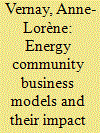|
|
|
Sort Order |
|
|
|
Items / Page
|
|
|
|
|
|
|
| Srl | Item |
| 1 |
ID:
171392


|
|
|
|
|
| Summary/Abstract |
Increasing distributed renewable energy generation renders balancing of energy supply and demand more challenging. Peer-to-peer (P2P) exchange of decentrally generated energy is a promising means to optimize renewable energy flows. While previous research has primarily focused on the technological and economic benefits of P2P energy trading, little research has investigated customer preferences in this context so far. It is thus still unclear to what extent private actors such as homeowners are actually willing to participate in P2P energy communities and if so, under which conditions. Here, we address this research gap by analyzing homeowners' trading decisions in simulated P2P electricity trading scenarios. Findings based on a sample of 301 German homeowners show that community electricity prices and state of charge of private energy storages are key determinants of homeowners’ trading behavior. We moreover identified four target groups that systematically differed in their decision-making strategies ranging from price-focused prosumers (38.9%) to classic non-trading consumers (22.6%). Our findings provide promising insights for the design of P2P communities and allow policy makers to more accurately predict risks and benefits associated with P2P projects. Finally, our findings contribute to the development of tailored policy instruments aiming to increase P2P trading in decentralized energy communities.
|
|
|
|
|
|
|
|
|
|
|
|
|
|
|
|
| 2 |
ID:
175900


|
|
|
|
|
| Summary/Abstract |
In this paper, we analyse community energy (CE) projects in urban settings. Building on insights from the literature on the geography of sustainability transitions, we examine how contextual conditions promote or hinder the development of CE. Furthermore, reflecting on calls for greater attention to agency in transitions, we investigated how actors engaged in urban CE projects exploit beneficial conditions or overcome obstacles related to some of the contextual conditions. Empirically, we draw on six case studies of CE projects from the Baltic Sea Region. To develop a thorough understanding of our cases we conducted 24 semi-structured interviews and analysed numerous secondary sources. Our results show that institutions as well as visions, e.g. plans for future energy generation, are important contextual features for urban CE projects. Local actors seek to overcome unfavourable contextual conditions for CE initiatives by building trust, appealing to their community's sense of identity, networking, and promoting demonstration projects. Based on the results, we recommend that local and national governments address the following four issues to strengthen the role of CE in the transformation of urban energy systems: 1) harmonising policies; 2) creating a culture for transitions; 3) developing visions for CE; and 4) promoting policy learning from experiments.
|
|
|
|
|
|
|
|
|
|
|
|
|
|
|
|
| 3 |
ID:
191263


|
|
|
|
|
| Summary/Abstract |
The need to accelerate the decarbonisation of the energy system has led to renewed interest in energy communities. Such communities are now identified by institutions as new instruments that can contribute to four main policy objectives: i) increase renewable energy capacity, ii) mobilize private capital, iii) provide flexibility for the electricity system, and iv) empower consumers. Within the frame of the historically centralised French energy system, we present five energy community business models (ECBMs) and explore the extent to which they contribute to the four aforementioned policy objectives. Our analysis shows that, while no ECBM has yet enhanced the flexibility of the grid, each ECBM contributes differently to realising three other policy objectives. We also show that the diffusion of ECBMs remains limited as a result of legal, organisational and financial barriers. We propose three recommendations that could help ECBM diffuse – protect economic viability, support intermediaries that facilitate the adoption of ECBMs, and nurture local governments as key enablers. Our outcomes are intended to guide policymakers by providing insights into which types of energy communities could contribute most significantly to the various policy objectives and provide recommendations to include them in their energy policy roadmaps more effectively.
|
|
|
|
|
|
|
|
|
|
|
|
|
|
|
|
| 4 |
ID:
179711


|
|
|
|
|
| Summary/Abstract |
The recast of the Renewable Energy Directive (RED II) provides an enabling framework for “Renewable Energy Communities” (RECs) that is being transposed into law by the 27 European Union Member States by June 2021. RECs are majority owned by local members or shareholders who are authorized to share energy within the community, offering the potential to unlock private investment and financing for renewable energy sources and provide social benefits. However, successful implementation and a just energy transition requires the coupling of technological solutions with more open decision making, based on sound analysis, knowledge of engineering, spatial planning, and social science. We argue that financing and ownership models that address renewable energy complementarity, spatial organization of resource potential, demographics, pushback from incumbents, and inclusion of traditionally marginalized groups, are common issues across all Member States that are crucial for the transposition of RED II and a just energy transition. This paper highlights the benefits and challenges of widespread development of RECs, and using examples from the pending transposition process provides policy advice for effective implementation of the RED II with respect to RECs.
|
|
|
|
|
|
|
|
|
|
|
|
|
|
|
|
| 5 |
ID:
191399


|
|
|
|
|
| Summary/Abstract |
In recent years, the increasing popularity of renewable energy and energy-efficient technologies is creating a new movement towards more sustainable communities. Understanding energy consumption is important for the optimisation of resources and the implementation of ecological trends. This paper integrates electricity consumers into a cooperative framework for planning sustainable smart communities through aggregators, which reallocates consumers’ demand according to available renewable energy supply collected from consumers and service providers. The aggregated demand response also includes consumers involved in energy production activities through microgeneration capabilities. A characterisation study of the different types of demand preferences is performed by defining scenarios of communities and consumers’ behaviours, which are validated through a reputation factor. The results show that the system adequately manages demand reallocation following the preferences and contribution of consumers and/or prosumers. Besides, this research analyses the current energy policy concerning demand flexibility, demand aggregation and microgeneration capacity, and their regulations in Spain. Finally, microgeneration acceptance, the role of aggregators and prosumers in the scheduling process is also investigated through a series of surveys.
|
|
|
|
|
|
|
|
|
|
|
|
|
|
|
|
| 6 |
ID:
183574


|
|
|
|
|
| Summary/Abstract |
Energy communities (ECs) are considered an important element of the current energy transition. Most studies have focused on how to specifically engage citizens in such communities. In this paper, the emphasis is on the objectives of other stakeholders. Only by taking all motivations and interests into account can a successful project be established.
|
|
|
|
|
|
|
|
|
|
|
|
|
|
|
|
| 7 |
ID:
191287


|
|
|
|
|
| Summary/Abstract |
Energy scholars have associated energy communities with the notions of energy citizenship and energy democracy, as citizen-based democratic governance plays critical roles in their organizational models. However, these roles have recently been challenged by the growing involvement of diverse actors, including businesses and state authorities, in the governance of energy communities. Limited evidence exists of how this evolution has impacted the form and degree of citizen engagement in these organizations. This paper addresses this gap through an analysis of 164 French energy communities. We identify the following four energy citizenship configurations: full citizen ownership, shared citizen ownership, citizen crowdfunding, and civic participation. Then, we analyze their ownership structure and institutional logics. Our results indicate that models characterized by strong citizen engagement in ownership and a strong community logic dominate the French energy community landscape. Furthermore, the community logic is still prominent, even in models where citizens are less central. This suggests that the increasing involvement of other actors in energy communities has not fundamentally threatened such an organizational form as a vehicle for energy citizenship in the French context. Lastly, the paper identifies policies to encourage a variety of energy citizenship models and generalize meaningful citizen engagement.
|
|
|
|
|
|
|
|
|
|
|
|
|
|
|
|
| 8 |
ID:
177473


|
|
|
|
|
| Summary/Abstract |
In 2019, the European Commission finalized a legal framework for “Citizens” and “Renewable Energy Communities”, paving the way for their deployment. While the benefits of such communities have been discussed, there is increasing concern that inadequate grid tariffs may lead to excess adoption of such business models. Furthermore, snowball effects may be observed following the effects these communities have on grid tariffs. We show that restraining the study to a simple financial analysis is far from satisfactory. Therefore, we use the framework of cooperative game theory to take account of the ability of communities to share gains between members. The interaction between energy communities and the distribution system operator then results in a non-cooperative equilibrium. We provide mathematical formulations and intuitions of such effects, and carry out realistic numerical applications where communities can invest jointly in solar panels and batteries. We show that such a snowball effect may be observed, but its magnitude and its welfare effects will depend on the grid tariff structure that is implemented, leading to possible over-investments in photo-voltaic panels. In particular, we find that setting a fixed grid tariff strongly mitigates such over-investments.
|
|
|
|
|
|
|
|
|
|
|
|
|
|
|
|
|
|
|
|
|